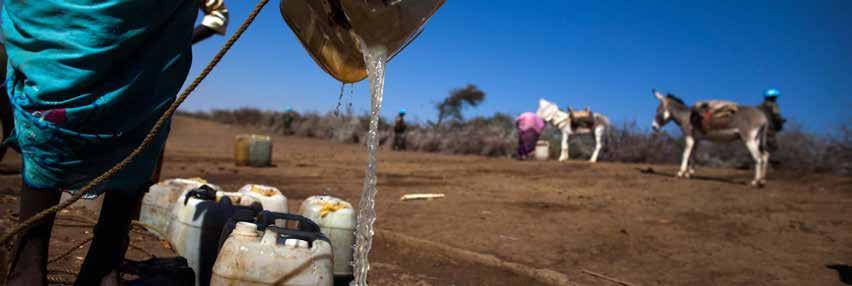
3 minute read
Environmental Change and Security Program
20 3 things to watch: ENVIRONMENTAL CHANGE AND SECURITY
1
Providing Safe Water Is Central to Stopping the Pandemic’s Spread
A lack of access to safe, clean, and affordable drinking water and sanitation is widely recognized as a threat to human health; it also hinders economic prosperity, political stability, and even access to education. Today, 2.2 billion people are without access to safely managed drinking water, and 4.2 billion people lack sanitation services. Put another way, every third person on the planet lacks safe drinking water, and half the world’s population does not have access to safe sanitation. And this already-urgent crisis of water insecurity has taken on new meaning in the era of COVID-19. Simply put, the pandemic cannot be stopped without a global effort to provide safe water to the world’s most vulnerable populations. This requires more than the proverbial “taps and toilets,” however. Many of the world’s most insecure people are living in conflict-affected situations, or have been displaced by violence. They lack access to basic infrastructure, stable health systems, and other life-saving resources. And increasingly, their water supplies are being leveraged as a weapon of war. COVID-19 highlights the importance of protecting water services as well as other essential services for the most vulnerable people in the world.
Featured Experts:
Lauren Herzer Risi, Project Director, Environmental Change and Security Program (ECSP)
Maxine Burkett, Global Fellow, ECSP
Sherri Goodman, Senior Fellow, ECSP / Global Women’s Leadership Initiative / Polar Institute
Aaron Salzberg, Global Fellow, ECSP
www.wilsoncenter.org/ecsp ecsp@wilsoncenter.org facebook.com/ecspwwc @newsecuritybeat 202.691.4000
years years
2
3

This Coronavirus Will Not Be the Last One
The COVID-19 pandemic has brought into stark reality the deep connections between wildlife, the environment, public health, and human security. And yet, despite the fact that much of the global population has been left stunned by this swift-moving and devastating pandemic, to some, what the world is experiencing today comes as little surprise. In fact, experts have been trying to sound the pandemic alarm for decades. As recently as a few years ago, epidemiologists at the World Health Organization coined the term “Disease X” as a descriptor for a COVID-19-like pandemic. In 2008, the National Intelligence Council’s Global Trends 2025 report included an eerily similar description of how a pandemic would likely start. Experts in these communities know that the threats posed by animal-borne infectious diseases to global health, security, and economic well-being are accelerating. Approximately 70 percent of these diseases originate with wildlife trade; but increasingly, these zoonotic diseases are linked to environmental change, human behavior, and demographic changes, like rapid urbanization and population growth. Understanding the underlying risks that created the conditions for COVID-19 to emerge—and the failures of public health, governance, and social systems to prevent and properly mitigate the spread of the virus—are critical to both addressing the current crisis and ensuring that it does not happen again.
It Is Time to Recalibrate U.S. National Security
The cascading effects of COVID-19 on human health, national economies, and society have elevated the pandemic to not just a public health crisis but also a national security threat. At the same time, extreme weather events and rising temperatures are increasingly recognized as a growing threat to both the United States and global stability. The link between climate change and the spread of infectious diseases is well established, as disease vectors for dengue fever and other maladies spread to new territories. The landscape of risks is changing, and so must the U.S. national security apparatus. Topics like climate change, land use, ocean health, and biodiversity need to be core national security concerns instead of sideshows left for future decision makers. Security dialogues need to include experts such as epidemiologists, ecologists, and climate scientists in order to establish a climate-smart, ecologically informed national security strategy. And decision-support tools must be expanded and informed by enhanced cross-sector and interagency efforts to coordinate on the development of predictive capabilities—the tools and policies that can help build pre-event resilience, and can help improve efforts during event onset and intensification, and post-event recovery.










